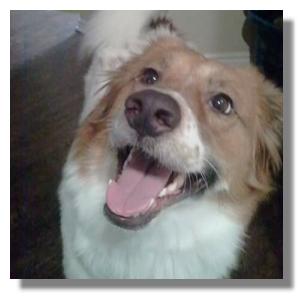Proper Oral Care Keeps Them
Smiling
|
 It’s very important that your pet has an oral exam
to prevent dental diseases. A periodontal diseased mouth sheds bacteria
into the blood stream which can cause secondary infections in their heart
valves, lungs, and kidneys, cause chronic coughing and other serious
consequences. The mouth should have an examination starting with the pediatric
patient and continued yearly thereafter. It’s very important that your pet has an oral exam
to prevent dental diseases. A periodontal diseased mouth sheds bacteria
into the blood stream which can cause secondary infections in their heart
valves, lungs, and kidneys, cause chronic coughing and other serious
consequences. The mouth should have an examination starting with the pediatric
patient and continued yearly thereafter.
Your pet should be seen right away if it has bad
breath, loss of appetite or difficulty chewing, discolored teeth, or drools.
These symptoms could be a sign of pain from an abnormal bite, an injury or
abscess of a tooth, or infections of the tissues around the teeth known as
periodontal disease.
It may be necessary for you to give your pet a
special dental diet, special dental chews and treats, apply a water additive or
an oral rinse, or even routinely brush their teeth with a special toothbrush
and toothpaste made especially for them. Human toothpaste isn’t formulated
for pet use so please use only veterinarian-approved pet It’s very
important that your pet has an oral exam to prevent dental disease. A
periodontal diseased mouth sheds bacteria into the blood stream which can cause
secondary infections in their heart valves, lungs, and kidneys, cause chronic
coughing and other serious consequences. The mouth should have an examination
starting with the pediatric patient and continued yearly thereafter. Your pet
should be seen right away if it has bad breath, loss of appetite or difficulty
chewing, discolored teeth, or drools. These symptoms could be a sign of pain
from an abnormal bite, an injury or abscess of a tooth, or infections of the
tissues around the teeth known as periodontal disease.
It may be necessary for you to give your pet a
special dental diet, special dental chews and treats, apply a water additive or
an oral rinse, or even routinely brush their teeth with a special toothbrush
and toothpaste made especially for them. Human toothpaste isn’t formulated
for pet use so please use only veterinarian-approved pet toothpaste.
If your pet’s teeth show signs of plaque,
calculus or disease they may need a dental x-ray and treatment under
anesthesia to identify problems, clean the teeth, and correct any issues.
Patients, especially 6 years and older, should have a wellness exam and blood
chemistry profile done at least one week before undergoing treatment under
anesthesia. Their diet may need to be adjusted, or they may need medications or
antibiotics based on the results of their lab work tests. Any significant
health concerns would need to be corrected beforehand thus helping to ensure a
safer procedure for your pet.
It’s necessary to put a pet under
anesthesia in order to perform a thorough oral examination, clean their
teeth and provide any essential treatments. Some pet owners are often hesitant
to have their pet’s teeth cleaned for fear of them having to be
anesthetized for the procedures. I have taken dental referrals from other
veterinarians for many years and to date, haven’t lost any patients to
anesthesia. Anesthesia has become safer in part to new injectable anesthesia
and more sophisticated monitoring. Most are reversible with the patient
eliminating them from their body with no after-effects. I will be glad to
discuss anesthesia with you previous to your pet having any dental hygiene
procedure.
|
Call Today to Schedule Your Pet's Oral
Exam! 817-225-6722
click here for new patient client
form
Some Common Dental
Terms
|
* Abscess - An infection in a tooth, soft tissue around a tooth
or in the bone.
* Apex - The tip at the root of a tooth.
* Bite - The relationship of the upper and lower teeth when the jaw is closed.
* Bonding - A dental restoration technique using a composite resin to repair or
modify the shape or color of a tooth.
* Bone Resorption - Sometimes the result of gum disease which causes a decrease
in the bone supporting the roots of teeth.
* Calculus - A build-up also known as tarter which stains teeth brown or
yellow.
* Cleaning - Appropriately known as “Prophylaxis.”
* Decay - The loss of tooth structure.
* Extraction - The removal of a tooth.
* Gingiva - Is gum tissue and Gingivitis is inflammation of the gum tissue.
* Malocclusion - Misalignment of the upper and lower teeth.
* Mandible - The lower jaw.
* Maxilla - The upper jaw.
* Molars - The back teeth used for chewing food.
* Overbite - A vertical overbite of the front teeth.
* Periodontal Chart - A record for the measured depth of gum pockets around the
teeth.
* Plaque - A build-up of a soft, sticky substance on teeth due to inadequate
dental hygiene.
* Prosthodontics - A term associated with oral surgery, root canals and crowns.
* Pulp - The tissue inside a tooth.
* Root Canal - A procedure performed to save a damaged tooth.
* Scaling - The removing of plaque and calculus from tooth surfaces.
* Tarter - the more common term for calculus.
|
|

|

